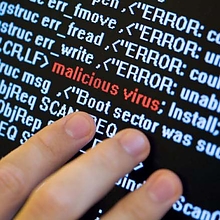MC2 Faculty, Students Present Nine Papers at ACM CCS 2016

Nine research papers authored by faculty and students in the Maryland Cybersecurity Center (MC2) were recently presented at the Association for Computing Machinery Conference on Computer and Communications Security, or ACM CCS 2016.
This was the most papers presented by any of the 180-plus institutions submitting papers.
The annual conference, held this year from October 24–28 in Vienna, Austria, brings together information security researchers, practitioners, developers and users from all over the world to explore cutting-edge ideas and results involving information security.
“We were excited to see so much of our work accepted to this premier conference. It speaks to the broad range of cybersecurity topics our faculty and students are exploring, and the high quality of the work they are doing,” says Jonathan Katz, professor of computer science and director of MC2.
One paper, “FeatureSmith: Automatically Engineering Features for Malware Detection by Mining the Security Literature,” focused on automatically engineering features for machine-learning-based malware detectors. The paper was authored by Tudor Dumitras, an assistant professor of electrical and computer engineering with appointments in UMIACS and MC2, and UMD doctoral student Ziyun Zhu.
The researchers detailed how they developed an end-to-end system, called FeatureSmith, that automatically engineers features for Android malware detectors by synthesizing the knowledge described in thousands of scientific research papers.
Other MC2-affiliated papers presented at the conference were:
“5Gen: A Framework for Prototyping Applications Using Multilinear Maps and Matrix Branching Programs,” co-authored by doctoral students Daniel Apon and Alex J. Malozemoff and MC2 director Katz.
“Build It, Break It, Fix It: Contesting Secure Development” co-authored by doctoral students Andrew Ruef and James Parker, professor Michael Hicks, assistant research scientist Dave Levin and assistant professor Michelle Mazurek.
“How I Learned to be Secure: a Census-Representative Survey of Security Advice Sources and Behavior,” co-authored by doctoral student Elissa Redmiles and professor Michelle Mazurek.
“Measurement and Analysis of Private Key Sharing in the HTTPS Ecosystem,” co-authored by undergraduate student Frank Canglialosi and assistant research scientist Dave Levin.
“POPE: Partial Order Preserving Encoding,” co-authored by doctoral student Daniel Apon.
“The Honey Badger of BFT Protocols,” co-authored by doctoral student Andrew Miller.
“The Ring of Gyges: Investigating the Future of Criminal Smart Contracts,” co-authored by doctoral student Ahmed Kosba.
“Attribute-based Key Exchange with General Policies,” co-authored by doctoral student Alex J. Malozemoff.
MC2 is supported by the College of Computer, Mathematical, and Natural Sciences and the A. James Clark School of Engineering. It is one of 16 centers and labs in UMIACS.
